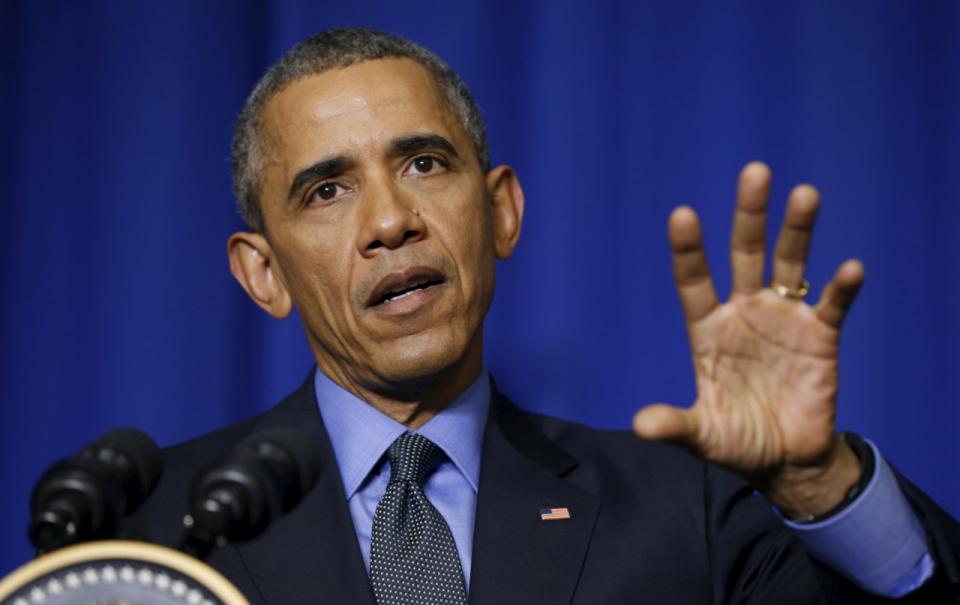Obama looks to defend handling of Islamic State
Amid holiday season fears of another terrorist strike on the U.S., President Obama will make a rare televised statement from the Oval Office on Sunday to defend his strategy for defeating the so-called Islamic State and keeping Americans safe at home after deadly attacks in Paris and California.
It will be just his third address to the nation from his desk in the West Wing of the White House. The remarks, set to start moments after 8 p.m. EST, come days after a husband and wife killed 14 and wounded 21 in San Bernardino, California. The FBI is investigating the bloodbath as a terrorist attack.
Since that massacre, Obama has convened regular meetings with top national security officials and telephoned French President François Hollande, whose country is still reeling from coordinated terrorist attacks on November 13 in Paris that left 130 dead. The Islamic State group, also known as ISIS or ISIL, claimed responsibility.

President Barack Obama holds a news conference at the conclusion of his visit to Paris. (Photo: Kevin Lamarque/Reuters)
At the same time, the president has faced renewed criticisms from Republicans, especially those vying to succeed him in the November 2016 elections, that he has consistently underestimated the threat posed by ISIS. And public opinion polls show profound pessimism about Obama’s efforts to crush the terrorist army in Syria and Iraq.
“The president understands that the country is very concerned about this issue, and I think what you’ll hear from him is a discussion about what government is doing to ensure our highest priority, the protection of the American people,” U.S. Attorney General Loretta Lynch told NBC’s “Meet the Press” on Sunday.
“He’ll talk about the actions we’ve taken, not just since 9/11, but since Paris to help keep the American people and American interests safe,” and he could press Congress to act, Lynch said, without specifying what steps the president might request.
Obama will also “call on the American people to pull out the best in themselves and not give into fear at this time,” Lynch said.
The president has escalated his military campaign against ISIS, basing elite U.S. commandos inside Syria and ordering a special new force to the region to help America’s partners fight on the ground while U.S. and allied warplanes pound the group from the air.
But some Republicans have criticized his refusal to describe the enemy as “radical Islamist extremists,” while others have pressed him to order more U.S. ground forces to battle ISIS.
“The president has the opportunity tonight to tell the American people how he is willing to adapt to the threat, and how he can better prepare our nation for a fight that will inevitably be passed on to his successor,” Republican Senate Majority Leader Mitch McConnell said in a statement on Sunday.
But Republicans aren’t the only ones pressing the president to do more to defeat ISIS in Syria and Iraq.
“We’re not winning,” the Democratic presidential candidate frontrunner, Hillary Clinton, told ABC’s “This Week.” Clinton, who served as Obama’s first-term secretary of state, has long advocated a more aggressive approach to the Syrian civil war that helped spawn ISIS. Early on, she pushed for arming Syrian rebels battling government forces loyal to strongman Bashar Assad, and recently called for expanded airstrikes and enforcing no-fly zones against government aircraft.
Clinton predicted that Obama would unveil “an intensification of the existing strategy.”
At home, U.S. officials fear so-called “lone wolf” attacks by extremists acting without specific direction from ISIS as much as by Islamic State fighters returning home. FBI Director James Comey has said that no evidence has surfaced so far indicating that the San Bernardino killers were part of an ISIS-operated cell. And Obama himself has deplored how hard it can be to detect and prevent sophisticated but relatively low-tech attacks while calling for stepped-up cooperation between the U.S. and its allies.
“You have eight individuals with light weapons; that’s a hard thing to track,” he said during a late November joint press conference with Hollande. “What is true, though, is that we can do a better job of coordinating between countries.”
Obama said the U.S. and its allies must enhance intelligence sharing, and pressed Europe to improve the way it monitors the flow of individuals across its borders and beyond.
“It doesn’t mean it’s always going to be 100-percent foolproof,” Obama said, “but we can do better on those fronts.”


